#this is the mark of great literature
Text
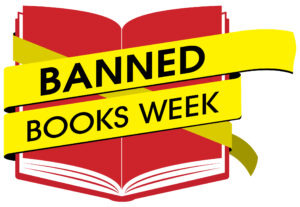
White House Hailed BANNED BOOK Authors!
By Miriam Kleiman, Public Affairs
In honor of #BannedBookWeek, we show how authors of some of the "most banned books" -- including Mark Twain, Harper Lee, Maya Angelou, John Steinbeck, Toni Morrison -- were celebrated, embraced and welcomed by the White House.
MARK TWAIN - endorsed by George W. Bush, First Lady Laura Bush, and FDR!
To honor much-banned author Mark Twain, FDR dedicated the Mark Twain Memorial Bridge (Hannibal, MO, 1936) and the Mark Twain National Forest (Rollo, MO, 1939).
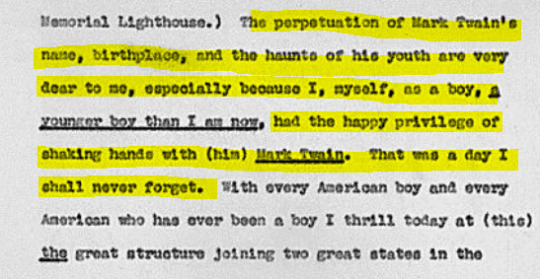
FDR's Address at the dedication of The Mark Twain Memorial Bridge, 9/4/1936, Hannibal, MO, NARA ID 197594.
Mark Twain National Forest (Rolla, MO), est. 9/11/1939.
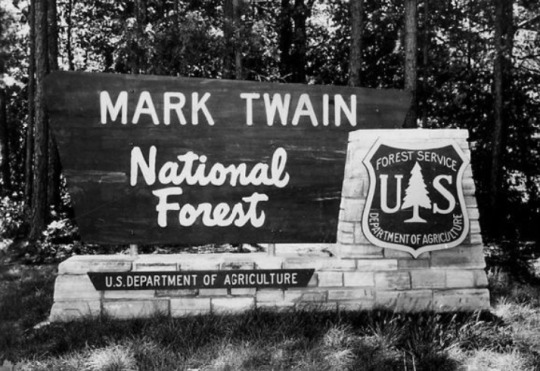
Sign for Mark Twain National Forest, 9/9/1965, NARA ID 2132546
President George W. Bush and First Lady (& librarian) Laura Bush held a White House Symposium on Mark Twain (11/29/2001).

Invitation to 2001 White House Symposium on Mark Twain. George W. Bush Library. NARA ID 148028517.
HARPER LEE, Presidential Medal of Freedom
Many praised author Harper Lee including Presidents George W. Bush and Barack Obama.

President Obama's Tribute to Harper Lee, 2/19/2016, Obama Library, NARA ID 236742454.

President George W. Bush with Presidential Medal of Freedom Recipient Harper Lee, 10/12/2007, George W. Bush Library, NARA ID 7431358.
JOHN STEINBECK, pals with LBJ!
President Johnson awarded writer John Steinbeck the Presidential Medal of Freedom in 1964. Steinbeck already had won a 1939 Pulitzer Prize for Grapes of Wrath and the 1962 Nobel Prize.

LBJ awards Steinbeck the Presidential Medal of Freedom while First Lady, Lady Bird Johnson, looks on. Steinbeck Center Photo Archive.
Two years later, (5/16/1966) Steinbeck and his 19 year-old son visited President Johnson at the White House, just a few weeks after John, Jr. had completed Army basic training and shortly before his departure for Vietnam. More about this visit here.
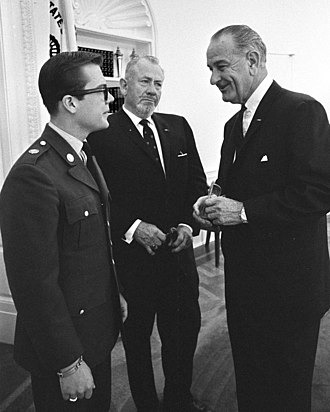
John Steinbeck Jr. at 19 (L)) with father John and LBJ in the Oval Office, 5/16/1966. Online.
Thank you note from Steinbeck to LBJ:
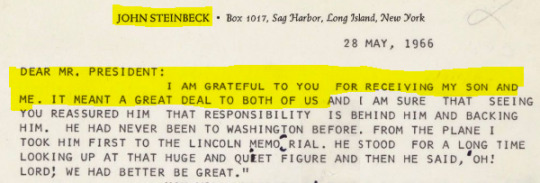
Letter from John Steinbeck to President Johnson, 5/28/1966. Johnson Library, NARA ID 6207609.
Listen to LBJ's call with Steinback about Vietnam (12/4/1966)
"Lady Bird sends her love and we look forward to seeing you..." NARA ID 205707398.
Ban COMICS, too? "Poisoning our Children’s Minds"
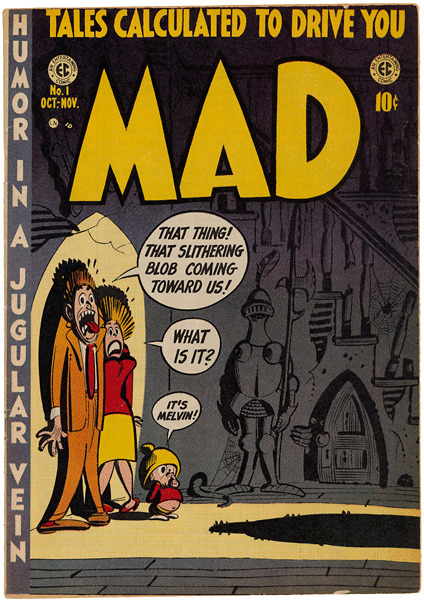
First Issue of “Mad Magazine”, 10/1952, Committee Papers, 1816 - 2011. Records of the U.S. Senate, NARA ID 595430.
The National Archives has a copy of issue #1 of MAD magazine, a permanent federal record that was submitted to a Senate subcommittee in 1953 on juvenile delinquency as evidence of comics’ corrupting influence on young people.
For three days, experts testified on whether or not comic books were “printed poison” for young people. The hearings created so much bad press for the comics industry that it created the Comics Code Authority to self-regulate the content of their comic books. MAD’s publisher reformatted the publication as a magazine in order to avoid the CCA restrictions. Learn more about these hearings here.
The National Archives Museum's (DC) Records of Rights exhibit includes this letter from an outraged mother urging Congress to ban “these lurid, highly colored comics" that lead to increased crime. She urges PTAs and "mothers of our beloved country" to unite and fight comics for 3 reasons:
"Would be a great step forward in the control of the young, especially the young boys."
"All the awful crime stories and murder mysteries [are] sent out to pollute the air and corrupt the minds of our younger generation."
"Reading all these lurid, highly colored comics ruins a child's appetite for good books..."
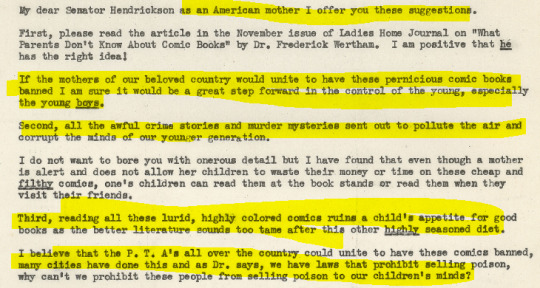
Letter from Eugenia Y. Genovar Regarding Comic Book Censorship, NARA ID 6120051.
Other frequently-banned authors/Presidential Medals of Freedom winners include:
Toni Morrison (2012)
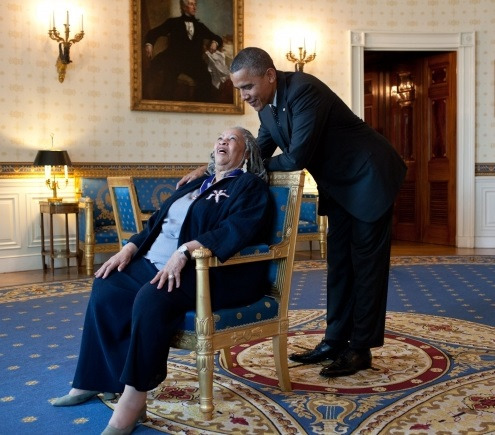
President Obama awards the Presidential Medal of Freedom to Toni Morrison, 5/29/2012. Pete Souza, Obama Library. NARA ID 176548906.
Maya Angelou (2010)
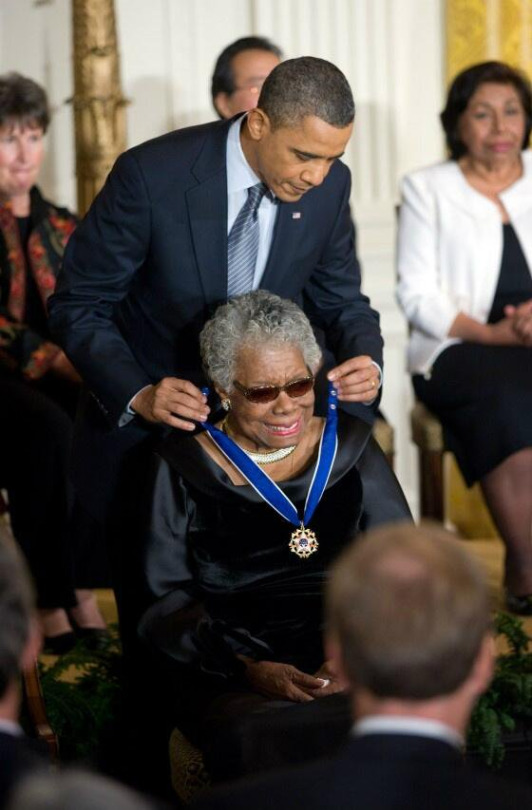
President Obama awards the 2010 Presidential Medal of Freedom to Dr. Maya Angelou, 2/15/2011. By Lawrence Jackson, Obama Library, NARA ID 231832591.
More online re: #bannedbook authors:
Letter to President Theodore Roosevelt from Upton Sinclair, whose novel “The Jungle” has been banned in banned in Yugoslavia, East Germany, South Korea, and Boston.
Deposition of Harriet Beecher Stowe (Uncle Tom's Cabin)
Facial Hair Friday: Mark Twain, Pieces of History
JFK & Hemingway: Beyond “Grace Under Pressure”
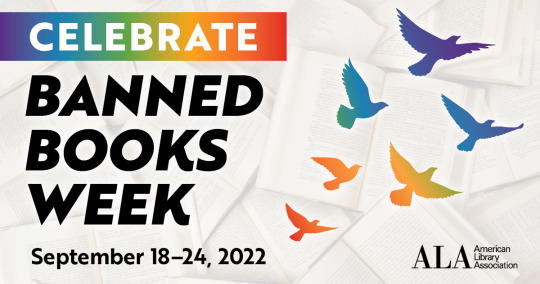
#banned#banned books#literature#freedom#education#ala#great books#censorshihp#american history#us history#american classic#mark twain#harper lee#to kill a mockingbird#huckleberry finn#fdr library#jfk library#grapes of wrath#toni morrison#maya angelou#comic books#comics history
128 notes
·
View notes
Text
normal sunday morning (reading up on malpractice laws because i think my wrist has indeed been mismanaged so flagrantly that suing would be appropriate)
#i’m gna call and change drs tomorrow so that’s step one toward solving things#but now that i have access to my mri analysis from last year we’ve been Reading The Literature#and the literature is quite clear actually that the treatment protocols for this specific injury are…#not the protocols she has followed. the literature specifically says those things Do Not Do Shit#and tomorrow marks one full year and it is. so bad. it is worse. and my right hand is fucked now too lol#i’m p sure i need surgery based on uhhhh the literature. and yet what is she up to? TRYING TO TELL ME I HAVE LUPUS??#it’s not great kc. it’s not great.#wrist saga tag
3 notes
·
View notes
Text
i’m doing a massive sort and cull of like 5+ years calcified book collection so. thinking about doing a retrospective on some of them
#discoveries: i have SOOO many great books i have not read#i have a massive and extremely chaotic collection given that i study literature#but i live somewhere without a significant bookstore in which i have to pay a LOT of money to ship books in#so what i tend to do for the ones i want to mark up is go hog wild at the library clear out sales and garage sales and it's lead to a#fairly wild and chaotic collection
7 notes
·
View notes
Text
Laito LE is so damn relatable 💀
#Like#The facade he created is a conditional reflex that; over time; has become an instinct#So whenever the factor that triggers his trauma hits his eye; he reacted almost instantly (unconsciously)#It’s kinda similar to gag reflex i think?… When there’s smth entering one’s throat they be gagging and trying to push it out (by vomitting)#He do be realizing what’s going on tho 🤔 Just that his mind and his body were not in sync. It’s smth he can’t control over. Which he#usually be controlling that. This gave birth to his downfall (DL is great with internal conflicts ngl)#Storyline… no.#Its genre; visual novel; created a huge advantage for all the psychology and stuff. However…#Would it be right to say the fact that LE’s plot is colossal & they’ll have to balance details about mainstream dilemma#And love life and whatever personal problem the character has (trust issues for example)#Making everything so rushed… at the end?#Andddddd not impactful at all.#Like… such simple solutions. That’s it?#Good plot is instead of making milestones and let the character reaches those marks; you put them in a situation where their choices will#affect their whole future path.#Which is why most Sakamakiya’s ending sucks. If not sucks then boring.#I would say LE has the most logical plot. THE ENDINGS HOWEVER (you finish the sentence)#Revising literature so i be analyzing Lewdto too#At least LE is informative (not good but not bad either)#CL is horrible. I deem Karl even less after that.#OH YEAH. KARL.#This dude is so… listless as an “antagonist”#Or a boss?#Like how he elaborated everything in his plan is so damn cool. Vampire dominos.#But his goals?#They feel… lacking. HE is lacking.#Ngl this dude made Ayato LE - a route that has been rlly fine & on the right track - feels insufficient at the end.#Like Ayato with the explosive energy of a shounen protagonist versus a “villain” who fucks the world up just to serve his science project#Sigh…. Which is exactly why mostly the one who r able to like Karl r ppl who thinks he’s hot.#Even Cordelia is more intriguing as a chara than this man. The most unsuitable person for the antagonist seat: her beloved husband 💖🎊🥇
4 notes
·
View notes
Text
Classic Lit Bracket-Round Two Part One: Gatsby vs. Huck Finn
*Tom Sawyer is not included in the Huck Finn entry
#tumblr polls#tumblr bracket#tournament poll#classic lit#classic literature#classic lit bracket#classic lit bracket round two#the great gatsby#the adventures of huckleberry finn#f. scott fitzgerald#mark twain
5 notes
·
View notes
Photo

Great Short Works of Mark Twain
This was a really interesting dip into a classic American author and a period of America I hadn’t read much from. Mark Twain’s writing style makes it feel as if he’s having a friendly conversation with you, and even though his stories wander it was still an entertaining read. This collection includes stories from piloting steamboats on the Mississippi and volunteering in the Civil War that still feel more personal than historical. However, the stories of Twain’s that are celebrated as humorous I didn’t enjoy as much. Maybe I’m not getting the joke, but I didn’t think they were as funny as I was lead to expect. Still, there were enough of the short stories that I enjoyed, and I loved “The Facts Concerning The Recent Carnival of Crime in Connecticut”, so I think I’ll keep this battered little paperback around.
#mark twain#great short works#great short works of mark twain#book#books#bookstagram#book review#review#review blog#the book look#fiction#short stories#compilation#collection#american lit#american literature#classic lit
2 notes
·
View notes
Text

Mark Twain, born in 1835 in Missouri, was a towering figure in humor and literature. William Faulkner crowned him the father of American literature. Twain died in 1910 in Connecticut.
All modern American literature comes from one book by Mark Twain called Huckleberry Finn. American writing comes from that. There was nothing before. There has been nothing as good since.
Hemingway, Ernest
1 note
·
View note
Text
Book Recommendations 📚📒
Business and Leadership:
"Good to Great" by Jim Collins
"The Lean Startup" by Eric Ries
"Zero to One" by Peter Thiel
"Leaders Eat Last" by Simon Sinek
"Outliers: The Story of Success" by Malcolm Gladwell
Success and Personal Development:
"The 7 Habits of Highly Effective People" by Stephen R. Covey
"Mindset: The New Psychology of Success" by Carol S. Dweck
"Atomic Habits" by James Clear
"Grit: The Power of Passion and Perseverance" by Angela Duckworth
"The Power of Habit" by Charles Duhigg
Mental Health and Well-being:
"The Power of Now" by Eckhart Tolle
"Feeling Good: The New Mood Therapy" by David D. Burns
"The Gifts of Imperfection" by Brené Brown
"The Anxiety and Phobia Workbook" by Edmund J. Bourne
"The Dialectical Behavior Therapy Skills Workbook" by Matthew McKay, Jeffrey C. Wood, and Jeffrey Brantley
Goal Setting and Achievement:
"Goals!: How to Get Everything You Want—Faster Than You Ever Thought Possible" by Brian Tracy
"The 12 Week Year" by Brian P. Moran and Michael Lennington
"Drive: The Surprising Truth About What Motivates Us" by Daniel H. Pink
"The One Thing" by Gary Keller and Jay Papasan
"Smarter Faster Better" by Charles Duhigg
Relationships and Communication:
"How to Win Friends and Influence People" by Dale Carnegie
"The 5 Love Languages" by Gary Chapman
"Crucial Conversations: Tools for Talking When Stakes Are High" by Al Switzler, Joseph Grenny, and Ron McMillan
"Nonviolent Communication: A Language of Life" by Marshall B. Rosenberg
"Men Are from Mars, Women Are from Venus" by John Gray
Self-Help and Personal Growth:
"The Subtle Art of Not Giving a F*ck" by Mark Manson
"Daring Greatly" by Brené Brown
"Awaken the Giant Within" by Tony Robbins
"The Miracle Morning" by Hal Elrod
"You Are a Badass" by Jen Sincero
Science and Popular Science:
"Sapiens: A Brief History of Humankind" by Yuval Noah Harari
"The Immortal Life of Henrietta Lacks" by Rebecca Skloot
"Cosmos" by Carl Sagan
"A Short History of Nearly Everything" by Bill Bryson
"The Selfish Gene" by Richard Dawkins
Health and Nutrition:
"The China Study" by T. Colin Campbell and Thomas M. Campbell II
"In Defense of Food" by Michael Pollan
"Why We Sleep" by Matthew Walker
"Born to Run" by Christopher McDougall
"The Omnivore's Dilemma" by Michael Pollan
Fiction and Literature:
"To Kill a Mockingbird" by Harper Lee
"1984" by George Orwell
"The Great Gatsby" by F. Scott Fitzgerald
"The Catcher in the Rye" by J.D. Salinger
"Pride and Prejudice" by Jane Austen
#books#books and reading#reading#goodreads#bookshelf#bookish#readersofinstagram#reading list#personal improvement#personal development#life advice#advice
1K notes
·
View notes
Text
RANDOM LINES OF DIALOGUE PROMPTS
* assorted dialogue, adjust as necessary
oh, great. more of your very eloquent bullshit.
i don't fear death. in fact, i yearn for it.
if it holds wine, it's a wine glass.
so... no guns. do you have an axe?
i'm not usually this direct, but... what is wrong with you?
this would have been much better with a gun.
i might be a bit too ambitious.
i think you'll see that the time was not wasted.
i can do it as well. i can do it for ages.
it doesn't hurt... well. it hurts a little bit now.
i'm fascinated by what happened in your fourteen minutes of absence.
no hard feelings. please look after yourself.
i am fundamentally incapable of showing off.
i'm just having a bit of a laugh with everyone.
that was so cringey and so uncomfortable.
i have no stitches. none!
momma didn't raise no fool.
i can borrow a dog whenever i want.
honestly? i don't know where to start.
i gave you culture... literature... water.
sometimes absence is more powerful than presence.
by the end of it, we were singing swedish drinking songs.
i think you were really reluctant to take accountability for that.
i just think you formed a bad relationship.
do you think it's fair?
what do you have for me now?
yours is... impressive.
we're all different.
don't you dare look away.
i didn't mind it, actually.
i'm just proud of myself.
i think it went in. it did go in.
i feel ashamed, mainly.
that's what i was going for.
i just want to acknowledge your technique.
it did escalate severely after five minutes.
none of us ever want to see this again.
we've reached the ten minute mark.
i don't think i know who i am.
there's a degree of style in the cowboy hat.
there are no fucking shoes!
you look like you've been kicked through a charity shop.
your phone's ringing.
haven't you ever seen one of those before?
they were sick and dangerous.
what does that say about whoever killed them?
this isn't half bad for college kids.
what the hell is this?
you might want to wear these.
have a safe night.
would you believe i'm single?
why do you always trail off like that?
#random dialogue#random prompts#sentence starter#rp meme#rp memes#roleplay memes#rp prompt#roleplay prompt#rp starters#ask meme#ask memes#roleplay meme#rp inbox meme#roleplay inbox prompts#inbox prompt#inbox meme#sentence starter prompt#sentence starters#mcflymemes#I'M WORKING ON A HOLIDAY THEMED ONE IN THE BACKGROUND RN THANK YOU FOR YOUR PATIENCE#IN THE MEANTIME HAVE THIS#MOSTLY DIALOGUE FROM TASKMASTER LOL
889 notes
·
View notes
Text
(Sorry I had to shorten some quotes)
From:
Anna Karenina-Leo Tolstoy
A Tale Of Two Cities-Charles Dickens
Moby Dick-Herman Melville
Pride & Prejudice-Jane Austen
War Of The Worlds-H.G. Wells
The Iliad-Homer
The Great Gatsby-F. Scott Fritzgerald
The Adventures Of Tom Sawyer-Mark Twain
The Adventures Of Huckleberry Finn-Mark Twain
The Divine Comedy-Dante Alighieri
Romeo & Juliet-William Shakespeare
My Immortal-Tara Gilesbie
#bookblr#books and literature#books and libraries#books and reading#classic literature#literature#literacy#quotes#book quotes#funny#bad jokes#terrible jokes#joke poll#academia#english literature#my immortal#ebony dark'ness dementia raven way
363 notes
·
View notes
Text

Hallowed
Pairing: Michael Gavey (Saltburn) x f!reader
Warnings: Toxic relationship dynamics, face sitting, smut.
Word count: ~1.3k
Summary: Her Early Medieval Literature essay is due, and Michael has his own cruel way of ensuring she stays focused.
Author's note: Can be read as part two of this fic, but also works as a standalone. Day six of the Smuffmas prompts - "future and face sitting". No tag list. Follow @fics-by-ewanmitchellcrumbs and turn on post notifications.
She lounges on Michael’s bed, clad in only knickers and one of his t-shirts, a copy of the Canterbury Tales grasped lightly between her fingers. Her eyes move over the words of Chaucer, but take none of them in, how could they? His long fingers draw lazy circles on her ankle, her legs stretched out up to the pillows where he reclines, the duvet wrapped around his bare midriff while he reads from a textbook called the Book of Proof.
Life feels simpler since Michael has entered it, despite the turbulent beginnings. She has given up her friends, under his advice, and there is now far less pressure to conform. Her only focuses are her studies and pleasing him, the latter of the two she takes great pleasure in.
It is always on his terms; when they see each other, what they do, how they do it, and despite his obvious initial inexperience he is a fast learner. His ability to make her fall apart, to make her relinquish all control is something he does expertly. The slight fear she feels towards him only adds to the excitement; he could destroy her if he wanted to, but if she plays nicely then he won’t, and she is more than happy to play nicely when the rewards for doing so are as satisfying as they are.
She sighs, his fingers upon her flesh making her core throb with want, even from the simple gesture of absentmindedly touching her leg. She lets her book slip from her fingers, raising up on her elbow to look at him.
“Michael…” she whines.
He looks at her impassively, adjusting his glasses. “The first of your three essays is due soon, isn’t it?”
“Mmm,” she responds with a roll of her eyes, flopping back down and stretching her arms above her head. “Early Medieval Literature.”
His hand moves from her ankle, fingertips ghosting over the exposed skin between the hem of his t-shirt and the waistband of her underwear. “And what have you written?”
She shivers beneath his touch, squirming slightly. “Am I really here to study?”
“I’ve no interest in sleeping with a failing literature student,” he pulls his hand away and she immediately misses his warmth. “So tell me.”
She groans in frustration. “Oh, I don’t know. Probably something about irony in the Merchant’s Tale.”
His textbook thuds closed and she hears the heavy sound of him dropping it onto the bedside table. When she chances to glance up at him she sees he is sitting straighter in the bed, his gaze hardened as he looks at her. “Probably?! You mean you haven’t started it? Have you even thought about your thesis statement, your in-depth analysis or how you’re going to conclude your ideas, if you’ve even had any?”
“Oh, come on,” she says softly, sitting up and reaching for him. “There’s still time. Can’t we just–”
“No,” he cuts her off. “I’ve been spoiling you, and it’s made you stupid.”
“I’m not stupid!” She protests. “If I remember correctly, it was you who called my degree a ‘glorified book club’.”
“You still need to try,” he tells her, frowning.
“You don’t try,” she argues with a shrug,” and marks in your first year don’t count towards the final degree.”
“I don’t have to try, but I still get firsts in everything. Marks this year may not count towards the final degree you get, but they count towards you keeping your scholarship. Think about your future instead of being a fucking brat for once in your life.”
His words are a sharp sting to her already fragile ego, and she lowers her gaze, fighting the sudden urge to cry.
“I’m not touching you again until your essay’s handed in and I’ve seen what your mark is.”
Her head snaps up, eyes wide with disbelief as she looks at him, searching his features for any indication that he’s being unserious. She finds none; he really means it.
“And you’re not to touch yourself. I’ll know.”
The next two weeks are torturous for her. On the occasions that Michael does invite her to his room, there is no more casual half dressed lounging on his bed. Instead, he has a study space set up for her at his desk, and won’t allow her to speak or leave until she has at least a thousand words written.
They meet up in the library during free periods so that he can read through what she’s written, and her skin burns hot with humiliation each time he screws up a page and throws it into the waste paper bin, calling her arguments “lazy” and “uninspired”.
It lights a fire of determination beneath her, but bubbling under the surface is also a heightened state of arousal, driven by the lack of intimacy, and the fact that she finds that she likes it when he is so authoritative over her.
By the time she has finished, she has produced an essay that both her and Michael are satisfied with; it discusses the use of irony in Chaucer’s poem, the Merchant's Tale. She has used a number of excerpts and lines from the poem for analysis, revealing the instances of irony in each, and from this has determined that the irony Chaucer used in the Merchant's Tale is controlled.
Her eyes light up when Professor Ware hands it back, and she sees the 85% that’s circled at the top of it.
A first.
She feels giddy with excitement as she knocks on Michael’s door that evening, brandishing the now dog-eared pages at him as he opens the door.
“A first, I got a first!” She squeals, watching as he takes the essay from her, his eyes moving slowly over the top page.
“Hmmm,” he settles it down on the desk, removing his glasses and placing them on top. “Take off your jeans and underwear.”
“Wha–what?” She stammers, her grin fading.
“You want your reward, don’t you?” He asks, moving to lay back on the bed.
She swallows thickly, excitement fluttering in her lower belly, as she quickly complies, ridding herself of the clothing that covers her lower half.
“Come here,” he commands softly.
She joins him on the bed, a gasp leaving her as he manhandles her until her knees are positioned either side of his head.
“My clever girl,” he whispers. His words could be mistaken for softness, were they not directly juxtaposed by the rapid darkening of his blue eyes, and the way his thumbs drag across the indentations between her thighs and pelvis. “I knew you could do it, you just needed a little…push.”
He drags his tongue from her opening all the way to her pearl, and her jaw goes slack, the wet sensation making her clench as she falls forward, hands clawing at the wall in front of her.
His grip on her thighs tightens and he tugs her flush against his face, the sloppy sounds of him devouring her are lewd combined with the wanton cries of pleasure that tumble from her lips.
She feels her mind go blank as he inserts his tongue inside of her, keeping it rigid as she begins to grind herself in a circular motion, keeping his nose pressed against where she needs it most, desperately chasing the release she’s needed the last couple of weeks.
His hum of appreciation reverberates through her core, and as he withdraws from her, plush lips wrapping around her sensitive bundle of nerves she feels herself fall apart as the growing ache intensifies, completely at his mercy as he laps at her, while white hot waves of pleasure wash over her.
She raises up when it becomes too much, jerking at how oversensitive she feels and gazes down at him through heavy lidded eyes, breathless.
He looks like an utterly different person without his glasses, almost kind, though she knows better. His chin is shiny with her slick as he smirks up at her.
“You’ve worked so hard,” he says quietly, though the edge of malevolence to his voice is unmistakable. “But don’t worry, you can give that pretty little mind of yours a rest while I fuck you stupid again.”
She is powerless to resist as he tugs her back to his face once more, beginning the exquisite torture all over again.
#michael gavey x reader#ewan mitchell#michael gavey x y/n#michael gavey x you#michael gavey smut#michael gavey imagine#michael gavey saltburn#saltburn michael gavey#michael gavey fanfiction#michael gavey fan fiction#michael gavey fan fic#michael gavey fanfic#saltburn#saltburn fan fiction#saltburn fanfiction#saltburn fanfic#saltburn fan fic
663 notes
·
View notes
Text
Imagine that a century or two from now, the eastern half of the United States is conquered by the Canadian Empire, its intelligentsia deported, its land colonized by Canadian immigrants, and its remaining people mostly gradually absorbed into a Neo-Canadian identity. The West reorganizes, developing a new political and cultural center, and comes to regard itself as the "true" United States, with the remnant culture of the East (by now much changed by Canadian rule) as representing an unchanged tradition stretching back to the time of George Washington. The holdout western half is subsequently conquered by the Reformed Mexican Empire, and while most of the population remains in situ, its elite is taken to Mexico City. There, for three or four generations, they do their best to maintain their distinct American identity, focusing on the American "civil religion," the distinctive political ideals and cultural features that mark them out as Americans, and come up with a new way of interpreting their history that allows America to be a perennial idea, something not directly physically tied to the territory of the United States, which no longer exists. They compose a body of historical works based on Washington Irving's rather fabulistic approach to early American history, the half-remembered popular versions of the stories of Columbus and the Pilgrims, the First Thanksgiving, even the Revolutionary War. They don't have access to the original texts anymore--let's say this is all taking place in a post-Collapse North America where long-range travel and communication is difficult and a lot of history has been lost--but they do their best. They append to these books, or include in their text, of history a copy of the Constitution, big chunks of the United States Code, and Robert's Rules of Order.
Subsequently, the Empire of Gran Columbia invades, conquers southern and central Mexico, and its Emperor lets the captive Americans go home. They return north, mostly to California, find that the version of American history and civics that is remembered there isn't the same as the version they have (not that the Californian one is correct--the Mexican Empire has suppressed English-language education and high culture in its Aztlani provinces), and set about reforming and reorganizing the Western States (as they're now called) to be more in line with the forms they brought back from the exile. In the meantime, other bits of important literature start being kept in libraries next to copies of the received histories: some bits of early American literature, like Hawthorne, the Song of Hiawatha, some highly abridged Herman Melville, Thomas Paine--heck, even some John Locke, and quotes or fragments from Shakespeare. Some traditionalists now argue the capital of the United States has always been located in San Francisco, and that Washington, D.C. only because the capital later, under the influence of Eastern heretics.
In the following centuries, the Western States retain their independence for a time, but eventually become a secondary battleground for a lot of other empires--the Mexicans, the Canadians, the Pan-Pacific Federation, and so forth. American culture remains distinctive, insulted in part by its unique traditions, though now everybody speaks Future Spanish, and only learns English to read the old texts. In this period additional material, including later compositions, continues to accrete, forming a distinct body of sacred American scripture, although it does not exist in a single canonical form. Attempts to reconcile distinct sources, like more literal and historically-grounded accounts versus the simplified narratives of figures like Irving, produce hybrid texts that sometimes are full of internal conflicts.
Oh, and through all this, some institutions of American government like the Supreme Court still function, although their rulings only apply to Americans, and there isn't much in the way of a federal bureaucracy.
Finally the Great and Sublime Brazilian Potentate conquers most of the Americas, sets up an American client state that roughly coincides with the heartland of the old Western States (California, Oregon, most of Washington and Nevada), and allows the Americans to elect their own President (subject, of course, to Brazilian approval). During this period, an apocalyptic street preacher from Los Angeles claims to have inherited the authority and power of George Washington, and is executed by the Brazilians; his later followers point to the prophecies of Emperor Norton, and out-of-context bits of a Quebecois translation of Moby-Dick and some Mark Twain stories to say no, really, he was George Washington. Inexplicably, a version of this religion becomes the dominant faith of the Brazilian Empire before it collapses. But long before then the American state in California fails, crushed when it tries to revolt against Brazilian rule; the remnant Easterners likewise dwindle down to only a few hundred souls living in a village in Alexandria, Virginia. Centuries from now, as the descendants of the descendants of the Brazilians colonize Mars, they will point to the sacred Americanist scriptures, the Neo-Americanist narratives of their prophet's life, and the letters written by the early leaders of Neo-Americanism, and say, "all of this was written by the spirit of George Washington, and is free from contradictions." Meanwhile the remnant Americanists, who have been writing about Americanism and how it applies to their everyday lives in the centuries since, and whose commentary has formed around the copies of the last editions of the U.S. Supreme Court Reporter (SCOTUS managed to outlast the final American state by a hundred years or so) plus the thoughts of the remaining Americanist community in Mexico, continue to regard their traditions as the unbroken and unaltered practice of American culture, politics, and ideals as they existed since the Revolutionary War.
This is, as far as I can tell, approximately how the Bible was composed.
1K notes
·
View notes
Text
Big Tech disrupted disruption
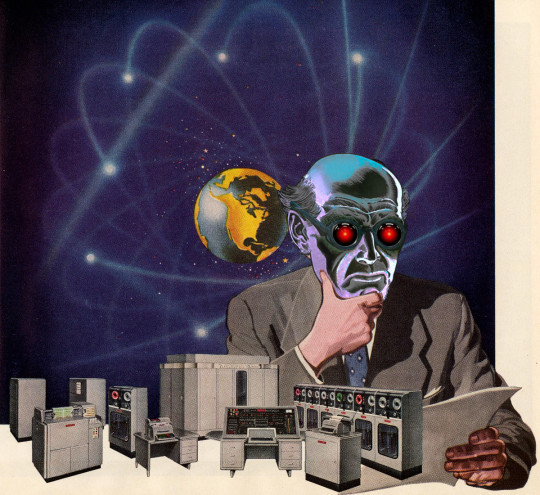
If you'd like an essay-formatted version of this post to read or share, here's a link to it on pluralistic.net, my surveillance-free, ad-free, tracker-free blog:
https://pluralistic.net/2024/02/08/permanent-overlords/#republicans-want-to-defund-the-police

Before "disruption" turned into a punchline, it was a genuinely exciting idea. Using technology, we could connect people to one another and allow them to collaborate, share, and cooperate to make great things happen.
It's easy (and valid) to dismiss the "disruption" of Uber, which "disrupted" taxis and transit by losing $31b worth of Saudi royal money in a bid to collapse the world's rival transportation system, while quietly promising its investors that it would someday have pricing power as a monopoly, and would attain profit through price-gouging and wage-theft.
Uber's disruption story was wreathed in bullshit: lies about the "independence" of its drivers, about the imminence of self-driving taxis, about the impact that replacing buses and subways with millions of circling, empty cars would have on traffic congestion. There were and are plenty of problems with traditional taxis and transit, but Uber magnified these problems, under cover of "disrupting" them away.
But there are other feats of high-tech disruption that were and are genuinely transformative – Wikipedia, GNU/Linux, RSS, and more. These disruptive technologies altered the balance of power between powerful institutions and the businesses, communities and individuals they dominated, in ways that have proven both beneficial and durable.
When we speak of commercial disruption today, we usually mean a tech company disrupting a non-tech company. Tinder disrupts singles bars. Netflix disrupts Blockbuster. Airbnb disrupts Marriott.
But the history of "disruption" features far more examples of tech companies disrupting other tech companies: DEC disrupts IBM. Netscape disrupts Microsoft. Google disrupts Yahoo. Nokia disrupts Kodak, sure – but then Apple disrupts Nokia. It's only natural that the businesses most vulnerable to digital disruption are other digital businesses.
And yet…disruption is nowhere to be seen when it comes to the tech sector itself. Five giant companies have been running the show for more than a decade. A couple of these companies (Apple, Microsoft) are Gen-Xers, having been born in the 70s, then there's a couple of Millennials (Amazon, Google), and that one Gen-Z kid (Facebook). Big Tech shows no sign of being disrupted, despite the continuous enshittification of their core products and services. How can this be? Has Big Tech disrupted disruption itself?
That's the contention of "Coopting Disruption," a new paper from two law profs: Mark Lemley (Stanford) and Matthew Wansley (Yeshiva U):
https://papers.ssrn.com/sol3/papers.cfm?abstract_id=4713845
The paper opens with a review of the literature on disruption. Big companies have some major advantages: they've got people and infrastructure they can leverage to bring new products to market more cheaply than startups. They've got existing relationships with suppliers, distributors and customers. People trust them.
Diversified, monopolistic companies are also able to capture "involuntary spillovers": when Google spends money on AI for image recognition, it can improve Google Photos, YouTube, Android, Search, Maps and many other products. A startup with just one product can't capitalize on these spillovers in the same way, so it doesn't have the same incentives to spend big on R&D.
Finally, big companies have access to cheap money. They get better credit terms from lenders, they can float bonds, they can tap the public markets, or just spend their own profits on R&D. They can also afford to take a long view, because they're not tied to VCs whose funds turn over every 5-10 years. Big companies get cheap money, play a long game, pay less to innovate and get more out of innovation.
But those advantages are swamped by the disadvantages of incumbency, all the various curses of bigness. Take Arrow's "replacement effect": new companies that compete with incumbents drive down the incumbents' prices and tempt their customers away. But an incumbent that buys a disruptive new company can just shut it down, and whittle down its ideas to "sustaining innovation" (small improvements to existing products), killing "disruptive innovation" (major changes that make the existing products obsolete).
Arrow's Replacement Effect also comes into play before a new product even exists. An incumbent that allows a rival to do R&D that would eventually disrupt its product is at risk; but if the incumbent buys this pre-product, R&D-heavy startup, it can turn the research to sustaining innovation and defund any disruptive innovation.
Arrow asks us to look at the innovation question from the point of view of the company as a whole. Clayton Christensen's "Innovator's Dilemma" looks at the motivations of individual decision-makers in large, successful companies. These individuals don't want to disrupt their own business, because that will render some part of their own company obsolete (perhaps their own division!). They also don't want to radically change their customers' businesses, because those customers would also face negative effects from disruption.
A startup, by contrast, has no existing successful divisions and no giant customers to safeguard. They have nothing to lose and everything to gain from disruption. Where a large company has no way for individual employees to initiate major changes in corporate strategy, a startup has fewer hops between employees and management. What's more, a startup that rewards an employee's good idea with a stock-grant ties that employee's future finances to the outcome of that idea – while a giant corporation's stock bonuses are only incidentally tied to the ideas of any individual worker.
Big companies are where good ideas go to die. If a big company passes on its employees' cool, disruptive ideas, that's the end of the story for that idea. But even if 100 VCs pass on a startup's cool idea and only one VC funds it, the startup still gets to pursue that idea. In startup land, a good idea gets lots of chances – in a big company, it only gets one.
Given how innately disruptable tech companies are, given how hard it is for big companies to innovate, and given how little innovation we've gotten from Big Tech, how is it that the tech giants haven't been disrupted?
The authors propose a four-step program for the would-be Tech Baron hoping to defend their turf from disruption.
First, gather information about startups that might develop disruptive technologies and steer them away from competing with you, by investing in them or partnering with them.
Second, cut off any would-be competitor's supply of resources they need to develop a disruptive product that challenges your own.
Third, convince the government to pass regulations that big, established companies can comply with but that are business-killing challenges for small competitors.
Finally, buy up any company that resists your steering, succeeds despite your resource war, and escapes the compliance moats of regulation that favors incumbents.
Then: kill those companies.
The authors proceed to show that all four tactics are in play today. Big Tech companies operate their own VC funds, which means they get a look at every promising company in the field, even if they don't want to invest in them. Big Tech companies are also awash in money and their "rival" VCs know it, and so financial VCs and Big Tech collude to fund potential disruptors and then sell them to Big Tech companies as "aqui-hires" that see the disruption neutralized.
On resources, the authors focus on data, and how companies like Facebook have explicit policies of only permitting companies they don't see as potential disruptors to access Facebook data. They reproduce internal Facebook strategy memos that divide potential platform users into "existing competitors, possible future competitors, [or] developers that we have alignment with on business models." These categories allow Facebook to decide which companies are capable of developing disruptive products and which ones aren't. For example, Amazon – which doesn't compete with Facebook – is allowed to access FB data to target shoppers. But Messageme, a startup, was cut off from Facebook as soon as management perceived them as a future rival. Ironically – but unsurprisingly – Facebook spins these policies as pro-privacy, not anti-competitive.
These data policies cast a long shadow. They don't just block existing companies from accessing the data they need to pursue disruptive offerings – they also "send a message" to would-be founders and investors, letting them know that if they try to disrupt a tech giant, they will have their market oxygen cut off before they can draw breath. The only way to build a product that challenges Facebook is as Facebook's partner, under Facebook's direction, with Facebook's veto.
Next, regulation. Starting in 2019, Facebook started publishing full-page newspaper ads calling for regulation. Someone ghost-wrote a Washington Post op-ed under Zuckerberg's byline, arguing the case for more tech regulation. Google, Apple, OpenAI other tech giants have all (selectively) lobbied in favor of many regulations. These rules covered a lot of ground, but they all share a characteristic: complying with them requires huge amounts of money – money that giant tech companies can spare, but potential disruptors lack.
Finally, there's predatory acquisitions. Mark Zuckerberg, working without the benefit of a ghost writer (or in-house counsel to review his statements for actionable intent) has repeatedly confessed to buying companies like Instagram to ensure that they never grow to be competitors. As he told one colleague, "I remember your internal post about how Instagram was our threat and not Google+. You were basically right. The thing about startups though is you can often acquire them.”
All the tech giants are acquisition factories. Every successful Google product, almost without exception, is a product they bought from someone else. By contrast, Google's own internal products typically crash and burn, from G+ to Reader to Google Videos. Apple, meanwhile, buys 90 companies per year – Tim Apple brings home a new company for his shareholders more often than you bring home a bag of groceries for your family. All the Big Tech companies' AI offerings are acquisitions, and Apple has bought more AI companies than any of them.
Big Tech claims to be innovating, but it's really just operationalizing. Any company that threatens to disrupt a tech giant is bought, its products stripped of any really innovative features, and the residue is added to existing products as a "sustaining innovation" – a dot-release feature that has all the innovative disruption of rounding the corners on a new mobile phone.
The authors present three case-studies of tech companies using this four-point strategy to forestall disruption in AI, VR and self-driving cars. I'm not excited about any of these three categories, but it's clear that the tech giants are worried about them, and the authors make a devastating case for these disruptions being disrupted by Big Tech.
What do to about it? If we like (some) disruption, and if Big Tech is enshittifying at speed without facing dethroning-by-disruption, how do we get the dynamism and innovation that gave us the best of tech?
The authors make four suggestions.
First, revive the authorities under existing antitrust law to ban executives from Big Tech companies from serving on the boards of startups. More broadly, kill interlocking boards altogether. Remember, these powers already exist in the lawbooks, so accomplishing this goal means a change in enforcement priorities, not a new act of Congress or rulemaking. What's more, interlocking boards between competing companies are illegal per se, meaning there's no expensive, difficult fact-finding needed to demonstrate that two companies are breaking the law by sharing directors.
Next: create a nondiscrimination policy that requires the largest tech companies that share data with some unaffiliated companies to offer data on the same terms to other companies, except when they are direct competitors. They argue that this rule will keep tech giants from choking off disruptive technologies that make them obsolete (rather than competing with them).
On the subject of regulation and compliance moats, they have less concrete advice. They counsel lawmakers to greet tech giants' demands to be regulated with suspicion, to proceed with caution when they do regulate, and to shape regulation so that it doesn't limit market entry, by keeping in mind the disproportionate burdens regulations put on established giants and small new companies. This is all good advice, but it's more a set of principles than any kind of specific practice, test or procedure.
Finally, they call for increased scrutiny of mergers, including mergers between very large companies and small startups. They argue that existing law (Sec 2 of the Sherman Act and Sec 7 of the Clayton Act) both empower enforcers to block these acquisitions. They admit that the case-law on this is poor, but that just means that enforcers need to start making new case-law.
I like all of these suggestions! We're certainly enjoying a more activist set of regulators, who are more interested in Big Tech, than we've seen in generations.
But they are grossly under-resourced even without giving them additional duties. As Matt Stoller points out, "the DOJ's Antitrust Division has fewer people enforcing anti-monopoly laws in a $24 trillion economy than the Smithsonian Museum has security guards."
https://www.thebignewsletter.com/p/congressional-republicans-to-defund
What's more, Republicans are trying to slash their budgets even further. The American conservative movement has finally located a police force they're eager to defund: the corporate police who defend us all from predatory monopolies.

Image:
Cryteria (modified)
https://commons.wikimedia.org/wiki/File:HAL9000.svg
CC BY 3.0
https://creativecommons.org/licenses/by/3.0/deed.en
#pluralistic#coopting disruption#law and political economy#law#economics#competition#big tech#tech#innovation#acquihires#predatory acquisitions#mergers and acquisitions#disruption#schumpeter#the curse of bigness#clay christensen#josef schumpeter#christensen#enshittiification#business#regulation#scholarship
284 notes
·
View notes
Note
i had a great time.
maybe you should go.
Maddy Perez
maybe you should go.
i had a great time.
Pronouns: He/Him/His, M!Reader

You and Lexi shared many similarities as twins. There was the shared love for literature and theater, the longing for Suze's attention, the bitter resentment toward Gus for leaving and never saying goodbye, the feeling of constantly being in Cassie's shadow, and of course, similar physical features.
But, like other siblings, you and Lexi were also vastly different.
Lexi preferred her solitude. She could spend hours alone in her shared bedroom on her laptop creating screenplay after screenplay in an online document. She was clumsy and awkward and despite her writing skills, she had trouble speaking to others without stammering or tripping over her words. Behind nearly every decision and action Lexi made had been a thought-out plan filled with 'what ifs'. You preferred leaps of faith into the unknown where the end destination wasn't visible until the last second. More often than not, you were left scrambling to ensure your ass wouldn't be toast.
Like the night after a party at a classmate's place when you woke up at home in your cozy bed with the slim body of your sister's closest friend cuddled up at your side and you left to stare at the ceiling debating your choices.
On one hand, Maddy Perez was bitchy and confident enough to pretend nothing ever happened between you and her. On the other hand, Nathaniel Jacobs had enough privilege to get away with murder if she ever let it slip.
So, there you remained, staring up at the ceiling and rethinking the life choices that led up to that moment. If only you hadn't agreed to go to the party with the girls. If only you hadn't agreed to Elliot's stupid challenge of flirting with Maddy to see what the school's queen bee would do. If only you'd encouraged the girls to head to their respective homes instead of crashing at the Howard residence. Then maybe, just maybe, you wouldn't be wondering what the hell Nate Jacobs would do to you if he ever found out you slept with his girlfriend. It wasn't as if you could sneak out and play dumb if she asked. She was in your bed, in your house.
Craning your neck to take a peek at her when she began to stir, you finally noticed her messy appearance. Her maroon lipstick had smudged considerably and from the red markings scattered across your skin, you could only assume how it'd happened. Her glittery, silver makeup appeared in a similar state, and the glitter smudged against your skin, twinkling with the sunlight that poured in from the window. Her hair was in the worst state you'd ever seen it in, and you found your gaze drawn to the light markings on her neck and shoulders. Her dark eyes fluttered open and for the first time since entering high school, you found yourself hoping for some disgust or repulsion in them. But instead, a yawn escaped her lips and she tiredly rubbed at her eyes.
"Morning." You murmured a bit awkwardly and dragged yourself up to rest your back against the headboard. She snorted quietly and brushed her raven hair out of her face, somehow still looking like a model. "About last night-"
"I had a great time. I never thought Cassie's little brother would have it in him. " Maddy began with a coy grin and you waited for a 'but' to follow. "We should do this again sometime." She purred instead and planted a kiss on the corner of your lips. You could practically feel your ego growing, but they weren't the words you wanted to hear from someone whose boyfriend had no problem with destroying the lives of those who even looked at her twice.
"Right." You forced a chuckle. Fuck. "I had a good time too, Mads, but I-I think maybe you should go or at least sneak into the girls' room before they wake up. I just... I think Cassie might get upset if she finds out and I, uh, I don't want to get you in trouble with Nate either."
She blinked at you and then blinked again. Her perfectly plucked brows slowly furrowed and the tips of her lips dragged downward. You couldn't quite tell what the look on her face meant. Was she disappointed? Hurt? Sad?
"You're kicking me out?" Ah. Of course, she was offended. Maddy getting turned down was an occurrence that only happened on blue moons and even then, whoever rejected her would only end up taking it back moments later.
"Maddy, I really think it's for the best. This will only end up hurting us both in the end." You tried again, speaking softly as if it'd do anything to convince her.
"And what if I don't care? What if I want to continue this?"
#x reader#x you#x y/n#x male!reader#x male reader#euphoria#euphoria x reader#euphoria x male reader#euphoria x y/n#euphoria x you#maddy perez#maddy perez x reader#maddy perez x y/n#maddy perez x you#maddy perez x male reader
276 notes
·
View notes
Note
Hei Neil
I followed the event featuring you and the First Ladies of Finland and Island and was absolutly delighted of it. I'm from Finland myself and was very surprised when I found out about said event, and that you would be takin part of talking about literature with dr. Jenni Haukio and Eliza Reid! (Actually found out that this kinda event had even been held just because I follow you here on tumblr and you happened to answer some question regarding on why you were taking part at this thing :D) I immedietly marked it on my calendar and watched it when it aired at midnight on this side of the world. (regretted this a little at the morning because the stream is available on youtube after it happened so I could have just watched it the next day..)
The whole event and conversation was great! And some very good points was brought up and they made me stop at some point to think about what is the meaning of literature in my life and why it even interests me so deeply. I was so proud to hear Jenni speak about our literary culture and the impact that literature has had on our nation over the past. Some famous Finnish writers and their works was also brought up and the way how they have shaped the Finnis language and identity. Overall the event was educational and I for myself learned a lot new things about Nordic literature especially Islandic literary and book gifting traditions! Also I was very suprised that you had actually visited Finland in your life but not so suprised by the fact that you had been interviewed in sauna cus that sounds exacly like something we might do. hehe
But afterall this was not an ask but more like a some sort of a message so please excuse me and have a nice day! Warm greetings from Finland, and hopefully you dare to come and visit us here again<3
I hope I will. I do love Finland so much.
412 notes
·
View notes
Text
Chapter 1: Les Usurpateurs



Part 1 of Words are Futile Devices- A Steddie x Reader Call Me By Your Name AU
Somewhere in Northern Italy, 1983
cw: ~3k words, no smut (yet), EVERYONE IS OF AGE!!!, a lot of unnecessary description for the vibes, reader is a bit of a cunt
notes: I'm back (I think)
Despite the lack of smut in this chapter, this and all my works are 18+ minors do NOT interact

There was something of a quiet intimacy in hearing the summer sparrows in the morning. Nothing but the gentle hum and chirp buried in the ripe peach trees. Thus marking the beginning of your yearly summer stay in Italy, of doing nothing but lounge around and savor the crickets at night, lying down on the couch of the villa your mother had inherited from her great grandparents.
What you liked about your summers in Italy was that time seemed to go slower, at your leisure, spending it between the lake with your friends, the town just a short bike ride away or staying home buried in the pile of books you had brought over just to keep in your room, a bit overgrown, but unable to make it “too yours” because of the guests you’d have to concede your room to a mere four weeks after your arrival at the villa.
Every summer, your father would host literature and art history students at the villa, aspiring professors, authors, archeologists, to help with their dissertations. They’d come with their american ways, obnoxiously disturbing the peace that you had created for yourself in the idyllic world you’d surrounded yourself into. Like that was a different astral plane you’d projected into, with the same friends as always, the same views, the same places to go. A different guest you’d have to surrender your room to for ten weeks, while you were banished to the communicating room, divided only by a shared bathroom. A small twin bed, an old desk and chair, a big enough window to let a good amount of light in, so you don’t suffocate and turn into a vampire. You despised that room.
They always arrived on the first day of July, when the weather seemed to turn from needing a light pair of jeans in the evening to clothes being unbearable. If you were in your room you’d limit yourself to a long enough shirt to keep you decent for the ghosts in the villa. There were no ghosts, but Giovanna, the housekeeper, would pop in from time to time to drop off your clothes– washed, ironed and folded. They smelled like citrus.
You were reading The Count of Monte Cristo when the guest arrived. The rippling sounds of the gravel under the heavy tires of the car sounding like an alarm. You placed your book face down on the page you had been reading and ran to the window. Curious to see what the tide had brought this year. Maybe someone whose English wasn’t very good. Or some lunatic who could only stay inside because of his pollen allergy. You wondered what they would have looked like. Tall? Ugly? Obnoxious in the sense where you could hear them play shuffle and slam and bang doors and cabinets and drawers in the morning when getting ready?
The car came to a stop in front of the door, right under the window of your room. The driver’s door opened, Giuseppe, the groundskeeper of the villa went around to open the trunk. Your heart thumped as you saw the passenger door open. It was a man. He was wearing a pair of white linen shorts, a blue flouncy short sleeve button- up shirt and gold- rimmed glasses. He pushed them up as he placed two hands on his hips, quickly removing one in favor of running his hands through his hair, styled and coiffed like he had not just come off an eight- hour flight.
“You must be…” You’d heard your father say, placing a finger on his bearded chin, the name of the boy must have slipped him.
“Steve. Piacere” the boy said, in an Americanized Italian, sounding like he had a hot potato in his mouth.
“Ah! Steve, Benvenuto” your father said, bidding his welcome and shaking the boy’s hand. Your mother extended a delicate hand as well, introducing herself with a bright smile. At the same time, the opposite passenger door opened. Another boy.
This one had long, frizzy hair. His face was framed by the bangs that stuck on his forehead. He was wearing a black t- shirt of a band you’d never heard of before tucked inside a pair of cutoff denim shorts held up by a belt, a chain clinking at the boy’s side as he stepped off the car. He wouldn’t let Giuseppe take his bags, insisting he could have done it himself.
Your father followed the boy with his eyes as he carried what appeared to be a duffel bag and a beat up suitcase towards your father.
“And this must be Eddie, then” your father said, as Eddie released his suitcase to shake your father’s hand.
“It’s a pleasure to meet you” the boy said, and from this new angle you could see that he sported three chunky rings on his left hand and a chain necklace around his neck. Your father saw you peeking out the window and motioned for you to come down.
“Shall we go inside? Show you around before dinner?” He motioned towards the boys as Eddie picked his stuff up once again and followed inside. You rolled your eyes. That was your cue to put on some pants and come downstairs.
Your father’s office was just on the right at the bottom of the stairs, as you hopped down the marble steps. You heard chatter.
“Oh there she is” you heard your father announce as you leaned against the doorframe of his office. You tended to dislike his theatrics “Boys, this is my daughter” the two guests turned around, reaching their hands to squeeze yours, as you firmly told them your name.
“Hey, I’m Steve,” he said, fixing his glasses with his other hand. He was soft, but his handshake was firm. Hands bigger than yours.
“You’re the archeology and history nerd” you quipped, a slight curl of your mouth followed it.
Steve didn’t seem to like the name, as he let go of your hand, mouth in a straight line. Embarrassed. Put off. You needed them to know that they weren’t welcome here.
“Hey, what’s up I’m Eddie” the other guy said. His hand was much more rougher and calloused than Steve’s, likely a guitarist.
“You’re the soon to be failed author?” you tilted your head at him,
you tilted your head at him, you heard your mother gasp, the indignation dripping from her mouth as she said your name. Eddie chuckled, a bit taken aback, but amused.
“How do you like daddy’s money, hm?” It was your turn to be indignant. You heard your father snicker behind the boy, followed by Steve. Your hand brusquely retracted from Eddie’s, as your mother poured springs of apologies on your behalf.
“She’s not like this, usually,” your mother said. Which was a lie. You were always like this. Rude, witty, sour.
You heard the disappointment in your dad’s tone “Go show them their room” he said, an intimation for you to leave.
“Make yourselves at home,” he said, before you guided them back upstairs.
Eddie huffed up the stairs. You didn’t offer to take his bags, as he seemed to not need nor want any help.
You opened the large pinewood door.
“You guys are gonna sleep in here. This is my room, but it’s gonna be yours for the rest of your stay. I’m gonna be in the next room over. Unfortunately we’ll have to share a bathroom” You could see sleep calling to them, as their eyes opened and closed slowly at the sight of a made bed.
Eddie dropped his bags and thumped on the bed, sleep immediately overtaking him.
“You have to excuse him, this is the first time he’s traveled outside of the States,” Steve said, sitting on the bed, leaning to take his shoes off.
“Nervous or what?” you asked, examining your bookcase in case you wanted to steal a book to take to your room.
“Just not as lucky as many” Steve shrugged, laying himself down on the mattress “this is his big shot. If your dad likes his stuff it’s all uphill from here” Steve groans, voice full of sleep “thanks for lending us your room, let us know when dinner is.”
And that was that. The boy fell into the arms of slumber.
And when Giovanna rang the bell to announce dinnertime, once again you peeled yourself away from The Count of Monte Cristo. You wondered if they were still sleeping.
You wandered into the bathroom and towards the door as you shot a quick look at the two sleeping bodies on the bed. Eddie was snoring. You were unsure if you should have woken them up.
You toyed with the bathroom door, swinging it between your hands. A grin decorated your face as you decided to slam it. Steve jumped awake, annoyed and scared.
“Dinner’s ready” you muttered, reaching for the handle of the door.
“I’ll pass, thanks” Steve said, shaking Eddie from his almost comatose state. The boy mumbled a semi- discernible “huh?”
“Dinner, Ed. ‘m not going, but you can feel free to” Steve said to the other, but he just turned around and sleepily muttered an “‘mgood, thanks.”
“He’s good. We’ll apologize to your mother in the morning” Steve said, laying back down, ignoring you completely.
Where’s my apology?
You were thankful for the lack of guests at dinner. That way you were able to silently eat and then slither back into your room. Back into your book. Lulled by the crickets, and the whisper of the trees in the weak evening breeze. You ended up falling asleep.
In the morning, Steve was already outside having breakfast with your parents. He looked like he had showered, but you didn’t recall the faint sound of the water running. He was wearing another pair of shorts, another flouncy shirt. Fumbling with a slice of toast, buttered with jam as he talked to your father about the morning paper.
“This is gorgeous by the way” Steve admitted, looking around “your orchard?” he looked at your mother, who was smiling proudly at the compliment.
“We grow a lot of fruit here, Giovanna makes apricot juice fresh every day” she smiled, biting into a slice of bread.
“You had a lot to say yesterday, now you’re a quiet little mouse?” your father teased, elbowing you lightly as you rolled your eyes.
“It’s okay, she apologized” Steve said, an assuring look in his eyes “she didn’t mean that stuff. She told me, it’s just her welcome wagon” he chuckled, and you felt yourself grow red. Why would he save you like that?
Eddie popped out from the door, hair in a bun, changed out of his shirt in favor for a new one.
“You should show them around some time, dear. Take them into town, maybe at the lake, I hope your father is not gonna keep them cooped up in his office for ten weeks” your mother giggled.
“Yeah, no we’d love that. Maybe I’ll get some inspiration for the book” Eddie sat down at the breakfast table, between you and Steve as he fumbled with a soft boiled egg Giovanna had to crack open for him. Embarrassment was veiled on his face.
You looked at his ringed hands, fumble with the small spoon. Did it always look so small?
“We’re not gonna start until the beginning of the week, but I might ask you to go get some supplies into town today and take these two with you. Eddie’s gonna need some nice paper for his typewriter, won’t you?” your father gave him a heavy pat on the shoulder, at which he smiled.
“Have another egg” your mother encouraged the boys. Eddie dug into the pot again, getting more confident with the way he spread the runny yolk on a slice of toast. Some of the runny egg dripped in between his fingers.
Just not as lucky as many.
Steve passed. “I know myself too well, if I have a second, I’ll just have a third and a fourth and a fifth and then I’m just gonna have to get rolled outta here” he joked. I know myself. Self- assured, cocky. You wondered what it felt like to really know yourself, to have everything figured out like he did.
You lent Steve Giuseppe’s old bike, Eddie got an old one of yours, the squeaky rusted tires alerting the two strangers’ presence. You were afraid you would have been pressured into giving one of them your own bike, seeing as you had already surrendered all of your possessions to them.
It was a pleasant day. Not too incredibly hot to be embarrassed if the two boys were to see you, face riddled with uncomfortable beads of sweat, breath heaving irregularly from the dry air of July. Instead, a nice breeze came through the mountains, as you debated on going for a swim later in the day.
That’s what you liked about your summers there. A swimsuit was always the wardrobe of choice under your summer clothes, the freedom to subsist in a plane of existence where your obligations began and ended within the span of a few miles of green grass and honeysuckle flowers.
The two boys followed you down the graveled road into town, which seemed to be deserted, families abandoning their houses in favor of driving to the beach for the weekend.
You asked them if they wanted to get a coffee, as you dismounted your bikes and parked them in front of a coffee place.
You sat outside as you sipped from your espresso cups.
“So” Steve broke the silence “What does one do around here?” you put down your book, the device you so desperately tried to ignore them with, trying to drown them out.
“Wait for the summer to end” you mumbled carelessly, going back to the words on the page.
“Ok and then in the winter you wait for the summer to start?” Eddie snickered.
“Seriously though, what do you do here the whole summer?” Steve interrupted, taking you away from your book again, as you tossed it on the table.
“I read, mostly. Play music, swim at the lake, go out” you huffed out annoyedly, reaching for the book. Eddie preceded you.
“Kafka? What happened to Monte Cristo?” he flicked through the yellowed pages.
“I finished it. How’d you know I was reading that?” you snatched the book back from his hands.
“It was on your bed before I slammed onto it. You should read something a bit more substantial,” he said “Kafka isn’t gonna teach you shit, why don’t you read Dorian Grey instead?” it annoyed you how patronizing his tone was.
“I read that last year, thanks for the help” you retorted, taking the book back from him with a roll of your eyes.
“Your dad seemed to make it abundantly clear that you need to be nice to us” Steve intervened, whining like a petulant child.
“Or what? You’ll snitch on me?” you snapped, the two boys looking at each other.
“Listen, sweetheart,” your nose curled at the nickname, “we’re not your enemies or whatever you think you’ve made us out to be. We really don’t want to be a nuisance to you” nothing about what he said seemed sincere. You rolled your eyes in response.
“Well,” Steve stood up from the metal chair with a violent noise, Eddie following suit “we’ll see you later,” as the both of them mounted their bikes and left. The creaking noises of the rusty old bikes followed in their pedaling.
They finally got the hint.
You spent the rest of your day at the lake, not really in a mood to interact with Chiara or Alessandro, two of your longtime friends. Instead, you made the slushing of the water current your friend, staring at the words on the page. Meaningless words. Kafka didn’t seem so enticing after all.
When you got home it went back on the dusty shelf. Your hand lingered on the spine of Dorian Grey for a moment. The cover was brown and worn, it was your mother’s before it became yours, your heart picked up at the words on the spine, gold lettering. You thought about what Eddie had said earlier.
You picked up Heart of Darkness instead.

tagging: @littlexdeaths, @xxbimbobunnyxx, @aphrogeneias, @rowanswriting, @stveharringtn, @impmunson, @strangerstilinski, @lavendermunson, @rebelfell, @bimbobaggins69, @cryingglightningg, @thornsnvultures, @jamdoughnutmagician, @take-everything-you-can, @eddiesxangel, @ali-r3n, @emxxblog, @corrodedcoffincumslut, @str4ngergirlw0rld, @yujyujj, @gregre369, @subconsciouscollapse, @aol19, @cooljadejacksonthings, @maeneedsabreak, @eddiesguitarskills, @freak-of-hawkins, @eddiesghxst
#eddie munson#eddie munson smut#eddie munson x reader#eddie munson fanfiction#eddie munson x fem!reader#eddie munson imagine#stranger things#eddie munson au#stranger things fanfiction#eddie munson fluff#steve harrington#steve harrington x reader#steve harrington smut#steve harrington fanfiction#steve harrington imagine#steve harrington au#steve harrington fluff#steve harrington fan fiction#call me by your name#call me by your name au
154 notes
·
View notes